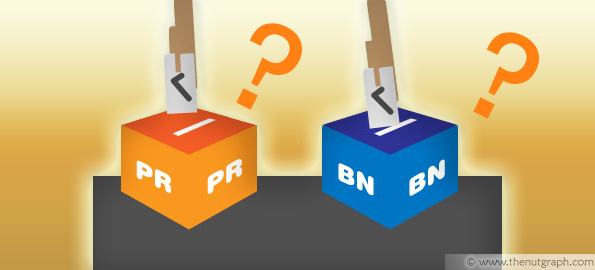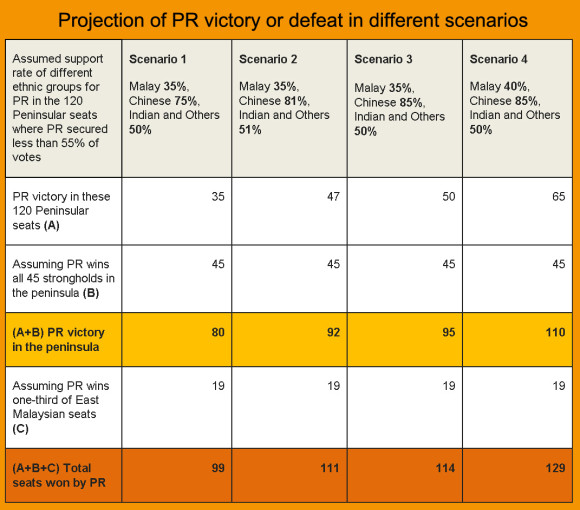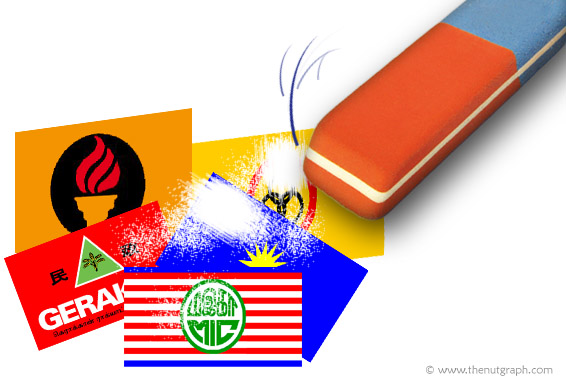OFFICIAL campaigning for Malaysia’s general election (GE) can begin after the nomination process of candidates is completed today. As candidates enter this lap of campaigning before polling on 5 May 2013, what are the different scenarios that may emerge from the polls? And what would each scenario mean for the Barisan Nasional (BN) coalition which has ruled the nation since independence for more than 50 years, and for the Pakatan Rakyat (PR)? The Nut Graph speaks to Wong Chin Huat to find out.

TNG: What will a BN win look like in this upcoming elections?
Given the BN’s bad press in recent months despite desperate efforts to shore up support, it is almost impossible for the coalition, under Prime Minister Datuk Seri Najib Razak, to do better than what it achieved under Tun Abdullah Ahmad Badawi in 2008.
One possibility is Scenario 1 in the table below, in which the BN wins with a much-reduced margin. If the PR retains all the parliamentary seats it won in 2008, which had a margin of 55% or more votes (stronghold seats), that will give the opposition 45 seats in Peninsular Malaysia in this elections.
For the remaining 120 Peninsular seats, the PR won 35 seats with less than 55% of votes and lost 85 in 2008. Assuming this time that in these seats, there is 35% Malay Malaysian support, 75% Chinese Malaysian support and 50% Indian Malaysian and other ethnic groups’ support, the PR will win 35 seats in the peninsula, which would be status quo [1]. This is basically a scenario where the Chinese support is not as strong as expected.
The PR is also expected to do better in Sabah and Sarawak. Assuming that it can win a third of East Malaysian seats as a result of chronic discontent and recent scandals, this would add another 19 seats. This would give the PR a total of 99 seats nationwide and leaves the BN with 123 seats, with East Malaysians making all the difference.
In this scenario, although the BN may retain power, Najib may not be able to keep his job. Tun Dr Mahathir Mohamad and several Umno leaders have been boasting about the certainty of winning back a two-thirds majority. This has raised Umno members’ expectations. A slim majority will see Umno deputy president Tan Sri Muhyiddin Yassin’s camp beating their drums and Mahathir blaming Najib for his “failure”. Muhyiddin will likely take over as prime minister and we may see some defections to the PR, further weakening the BN. If this does happen, expect a prolonged, messy and perhaps painful transition.
A second possibility in our first-past-the-post system is where the BN wins a majority of seats, but the PR actually wins the majority of votes. In this case, the BN would have little legitimacy to rule. Expect widespread protests by angry voters to force the BN to concede defeat. Some BN parliamentarians, especially those from Borneo, may switch sides to turn the tables around.
And what of the PR should the BN retain power?
A slim BN win may split the PR coalition as well. Opposition Leader Datuk Seri Anwar Ibrahim may retire from politics as promised, leaving the field open for possible successors. This may destabilise the PR coalition or it may be an opportunity to elect a collective team of young leaders to keep the coalition intact.

What would a PR win look like?
Scenario 3 above provides one answer. Assume the PR can capture 19 seats in Sabah, Sarawak and Labuan. Assume it further secures all the 45 Peninsular seats it won in 2008 that had 55% or more votes. Lastly, in the remaining 120 Peninsular seats, assuming it enjoys 35% of Malay Malaysian support, 85% of Chinese Malaysian support and 50% of Indian and Other Malaysian support, the PR will win another 50 out of the remaining “tough seats” in West Malaysia. This will give the PR a total of 114 seats over the BN’s 108 seats, a wafer-thin majority.
It would be hard for Umno to accept defeat in this case. It would likely approach PAS to form a national unity government or entice some PAS or PKR parliamentarians to defect. Such tactics may have little chance of working, not least because Umno will be seen as a sinking ship. Also, this will not be tolerated by the public and may trigger the defection of non-Malay or East Malaysian BN parliamentarians to the PR. This will delegitimise Umno, not just weaken it.
Now assume that in the 120 Peninsular seats, the PR’s Malay support rises to 40%, while its support rates among the Chinese as well as the Indian and Other Malaysians remain at 85% and 50% respectively. This will result in the opposition coalition picking up an additional 15 more “tough seats” in West Malaysia, bringing the total number of secured tough seats to 65. With its 45 stronghold seats, this would mean the PR has a total of 110 seats. Assuming the PR continues to win 19 East Malaysian seats, this will result in a more convincing victory of 129 seats, leading the BN by 36 seats (Scenario 4).
While this margin will be smaller than Abdullah’s 58 in 2008, the PR will have the benefit of being the rising force. As PR-won seats are normally larger in electorate size, such a result would also likely mean a clear lead of the PR over the BN in vote share, between 47% and 53%, for instance.
If this happens, there will be no room for a palace or military coup. Most BN lawmakers will quickly accept that the one-party state is over. Some may even defect to the PR, either individually or en bloc as a party. However, taking on board BN defectors at the birth of a new government may end up corrupting it and set a bad precedent.
The dust should settle quickly and markets will bounce back as uncertainty evaporates, and the PR will grow rapidly from its success.
What will be the fate of non-Malay BN parties MCA and MIC in the event of a PR win?
A PR win will almost certainly mean a complete or near wipeout of the MCA, MIC, Gerakan, SUPP in Sarawak and LDP in Sabah.

The main selling point of these parties now is actually incumbency, the so-called communal representation they provide in government. They will lose their appeal once they become opposition. In fact, many of their leaders are not prepared to struggle as opposition and may join the PR parties.
As the remnant Umno will probably survive only in the Malay belt and see no prospect of returning to power, it will not care to be moderate and accommodate its non-Malay partners as before. This means the non-Malay BN parties will have no future of returning to power, causing an exodus of its more able leaders. Parties with more assets like the MCA, which owns The Star, may last a bit longer. But it will eventually join the footsteps of its Sarawak sister party, the Sarawak Chinese Association (SCA), which dissolved itself in 1974, after losing all but two state seats in the 1970 elections.
Any other scenarios possible?
There is the possibility of a hung Parliament, where both sides win an equal number of 111 seats (Scenario 2). This will occur, for example, if the PR wins 19 East Malaysian seats, retains 45 West Malaysian strongholds and secures support from just 35% of Malay Malaysian voters, 81% of Chinese Malaysian voters and 51% of Indian and Other Malaysian voters in the 120 tough seats in the peninsula. This will certainly trigger defections from either side and lead to a period of uncertainty following the results.
From the standpoint of stability, voters should risk giving a two-thirds majority to either party rather than risk a hung Parliament.
What must the BN and PR do to serve their coalition’s best interests?
The BN and PR should sign a pact to guarantee the other side a chance to rule should they win the elections. This is important as both sides now have a realistic chance to win the elections but face protests that may stop them from holding on to or taking over power. We certainly need both sides to pledge that if they lose, they will abide by the outcome; and if they win, they will not conduct a “witch hunt” of the losers. ![]()
[1] Based on the constituencies’ ethnic composition as of December 2012.
Wong Chin Huat is a political scientist by training and was a journalism lecturer prior to joining the Penang Institute, a Penang government think tank. If readers have questions and issues they would like Wong to respond to, they are welcome to e-mail editor@thenutgraph.com
Read previous Uncommon Sense columns


ellese says
Why isn’t there a scenario that Malay and Indian [Malaysians] are on one hand and Chinese [Malaysians] on the other. If BN wins in this manner it can continue winning like and thus marginalizing the Chinese [Malaysians] (since they reject BN). There should not be any representatives of the Chinese since DAP played to the hilt of Chinese sentiment to reject MCA. At this juncture, a possible scenario would be that the Chinese [Malaysians] will take stock that DAP will be of no further use, abandon them and join the mainstream again.
JW Tan says
Because Pakatan Rakyat is not just the DAP.
Philip LIM says
ellese,
In your scenario, being no Chinese [Malaysian] representatives in Government, perhaps a lot of Chinese [Malaysians] already felt there were no representatives in the Government prior to dissolution. We’d gotten by, we get by, we’ll get by.
neptunian says
Don’t see an issue there.
Govt service – < 1% Chinese [Malaysian] GLCs - < 1% Chinese [Malaysian] Quotas for all kinds of Govt supported initiatives based on race, not on needs. Do not need [any] Chinese [Malaysian] reps in Govt, but need the following; 1. Less blatant corruption - a little corruption (5%) is OK by me. Wages are way too low 2. Better security - same as above - police resources used for political purposes rather than crime prevention and solution 3. Clear rules for industrial development - all kinds 4. Equitable allocation of funds to states. Kill the rubbish of channeling federal funds to private crony groups I can list a whole bunch more and it does not need Chinese [Malaysian] reps.
voster says
Cannot agree with some key assertions here.
In the first scenario, Najib is unlikely to lose out on his position. Two coups in a row would be hard to take and Najib himself is personally popular, if not the rest of his institution. I certainly don’t see Mahathir coming to say that he was wrong in choosing Najib. Especially after hyping him and all around up to the high heavens, the sort of treatment that he incidentally never gave his immediate successor.
Wrong twice in a row! What sort of elder statesman would ever do that?
Re the scenario where BN wins without the popular vote, I think that the author is correct in saying the protests will appear, but is very much engulfed in wishful thinking that this will actually lead to defections or the downfall of the government. The usual refrain of, “terimalah kekalahan” will return, the BN government will close ranks and the manifestations of anger will peter out. After all, even if PR wins the popular vote, it won’t be a thumping enough majority that the losers are completely overwhelmed.
Re the case where PR wins a slim majority, I would still think that there would be enough defections that BN will return to power. The key thing to remember here is that defections will be be predicated on what defectors will get. With slim margins, that would be a lot of the government’s largesse being concentrated on a few frogs, a potent force indeed.
Then, consider that the government’s patronage politics is more or less a zero sum game. The pie is only so big and giving patronage to one politican is necessarily reducing patronage to another politician, if not downright taking it from the latter.
In the initial days of a PR slim majority, which politician would be more willing to give up a part of their share of the wealth to entice defectors?
I would put my money on BN. The psychology of humans who fear loss more than they are driven by profit means that the people losing are more likely to resort to more drastic actions.
voster says
Thus, I think that BN will outbid PR in the case of a small majority.
If that doesn’t happen though, I agree with the author’s prediction that PR will be riding on the crest of its electoral victory wave. This momentum will likely be used to consolidate their positions in the government by whatever means, e.g. handouts, electoral reform etc.
I have no doubts that an incoming PR will not remove all of the systemic features of our political system that give the incumbents such a big advantage, so patronage politics will go on, as will the use of government resources for “puji diri” types of activities.
But the hope is that it would at least be toned down by PR politicians, realising that keeping all the powers of incumbency in place may mean that if BN returns to power, they would return to the receiving end of all these injustices.
And if the PR only hold a small majority, then it should always be looking over its shoulders.